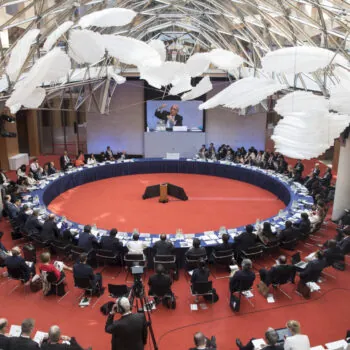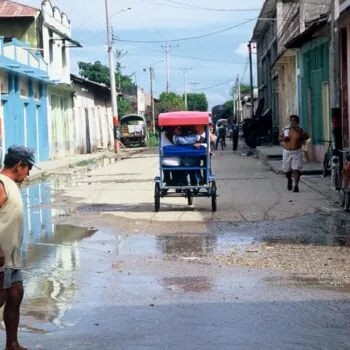Keen watchers of the UN climate talks are used to turning their eyes to Bonn each June for the mid-year negotiating session. But this year, to watch European climate diplomacy in action it’s worth keeping an eye on the grand halls and garden parties in Brussels.
EU summits with Caribbean and Latin American leaders, China and African countries are all scheduled for June and July, following the G7 in Germany. This summer, European leaders can’t avoid joining the conversation on climate.
These summits offer quite a different opportunity to the normal UN climate conferences. Free from the contested policy detail of the negotiation corridors, these high-level discussions allow for more leaders to engage in more candid conversations with other statesmen and women. They are the perfect moment to share visions for the Paris deal and, more importantly, the international climate regime it should establish. The conversations between Heads of State and Government will inevitably focus on questions of national interest, and offer an opportunity to bridge the gap in understanding in motivations and expectations for COP 21.
Kick-starting the European motor
Despite the international spotlight turning to Paris for December’s anticipated climate deal, France’s fellow European leaders have so far showed little interest, choosing to manage down rather than shape expectations for the conference. Without a convincing story on why a strong Paris outcome matters for European citizens and businesses, EU leaders will continue to underestimate the value of investing political leadership well ahead of Paris.
This lack of conviction from Europe on why Paris really matters is driving many of Europe’s traditional allies in the UN climate talks to doubt Europe’s sincerity and motivations in pushing for a more ambitious outcome. This is fuelling tensions that could throw the Paris negotiations into disarray. To avoid this, Europe should use this summer’s summits as a platform to articulate a more convincing, honest narrative why a strong Paris outcome matters for Europeans and how Europe is working practically to achieve this. This can forge political alignment around core shared priorities to build a broad alliance to secure a rules-based deal that holds all world leaders to account in accelerating the global transition to a zero carbon economy.
Telling a good story: why Paris matters to Europe
Fortunately for Europe’s leaders, a compelling European case for why Paris matters can easily be built on four key points:
- Europe is vulnerable to a changing climate. Over the past three decades, Europe has seen a 60% increase in extreme weather events including flooding, drought and heat waves. Estimates suggest that climate-related damages in the EU may rise to more than €190bn per year this century.[1] The EU has a vested interest in global resilience through strong mitigation and robust adaptation.
- Europe needs a stable and rules-based world to prosper. Europe depends upon a global rules-based system to deliver security, stability and growth through its diplomatic relations and trading partnerships. Climate change threatens to undermine global rules, leaving Europe exposed to disrupted access to affordable resources and supply chains.
- Managing climate risk is essential to Europe’s prosperity and security. Many countries close to Europe are highly vulnerable to climate change. Given already high levels of instability and economic vulnerability in these regions climate change represents a significant threat to European neighbourhood security[2]. Furthermore, demographic shifts in Europe mean its prosperity will increasingly depend on trade and investment with urban consumers in fast growing transition economies, whose incomes are under greatest threat from early climate impacts.
- Europe has already committed itself to decarbonisation. Europe has made huge financial, institutional, political and commercial investments into decarbonising its economy, with a near carbon free projected by mid-century. Reversing these trends is not economically or politically feasible.
A two-way conversation
But to maintain support for the low carbon transition at home Europe needs to speak confidently to its public and industries that more countries are joining Europe on the transition to zero carbon. To do this, there is a political deal to be made. This means EU leaders proactively forging mutually beneficial alliances around shared priorities. To do this, Europe should be upfront about what it needs in the deal – and where it can show flexibility to address others’ concerns.
EU-CELAC
To show Europe remains committed to getting the world a pathway to keep warming below 2C, the EU needs to work with its Latin allies to drive up collective mitigation ambition. This means allying with Latin American countries in support of regular reviews with a mechanism to ratchet up ambition in line with an ambitious 2050 goal, as technology and political will accelerate the transition to zero carbon.
EU-China
The EU needs to be clear with China that Paris must deliver strong rules, accountability and the transparency to give certainty that promises will be delivered. While China chose to announce its plans to curb emissions in conjunction with the US last October, its dialogue with the EU can focus on redirecting investment flows into climate resilient, low-carbon infrastructure to embed this headline ambition in an economic model fit for the 21st century.
EU-Africa
Europe’s legacy of giving practical and timely assistance to developing countries in responses to extreme weather events and natural disasters has formed the basis of many past EU-Africa summits. But with an increasing rate and scale of climate impacts, this year European leaders need to give adaptation the political parity with mitigation that African countries on the frontline demand. Europe’s experience of institutional innovation to manage shared challenges equips it to engage meaningfully in conversations with African leaders on reforming the international system to build global resilience to climate risk.
The success of Paris won’t be decided inside negotiating halls; it will hinge on the decisions political leaders take afterwards and the shifts in the real economy. This gives political leaders a huge stake in Paris. The successive arrivals of world leaders in Brussels provides an occasion for Tusk, Mogherini and Juncker to understand that climate change is a core diplomatic priority, as part of a political (not just economic) dialogue with international partners. These summits also provide rallying points for civil society actors and campaigners to call for credible EU leadership. Ahead of a summer break, June offers the perfect moment(s) for leaders in Europe to get in the game.
[1] Joint Research Centre (2014)
[2] http://ec.europa.eu/regional_policy/sources/docgener/studies/pdf/region2020_phase2/challenge2020_report.pdf


